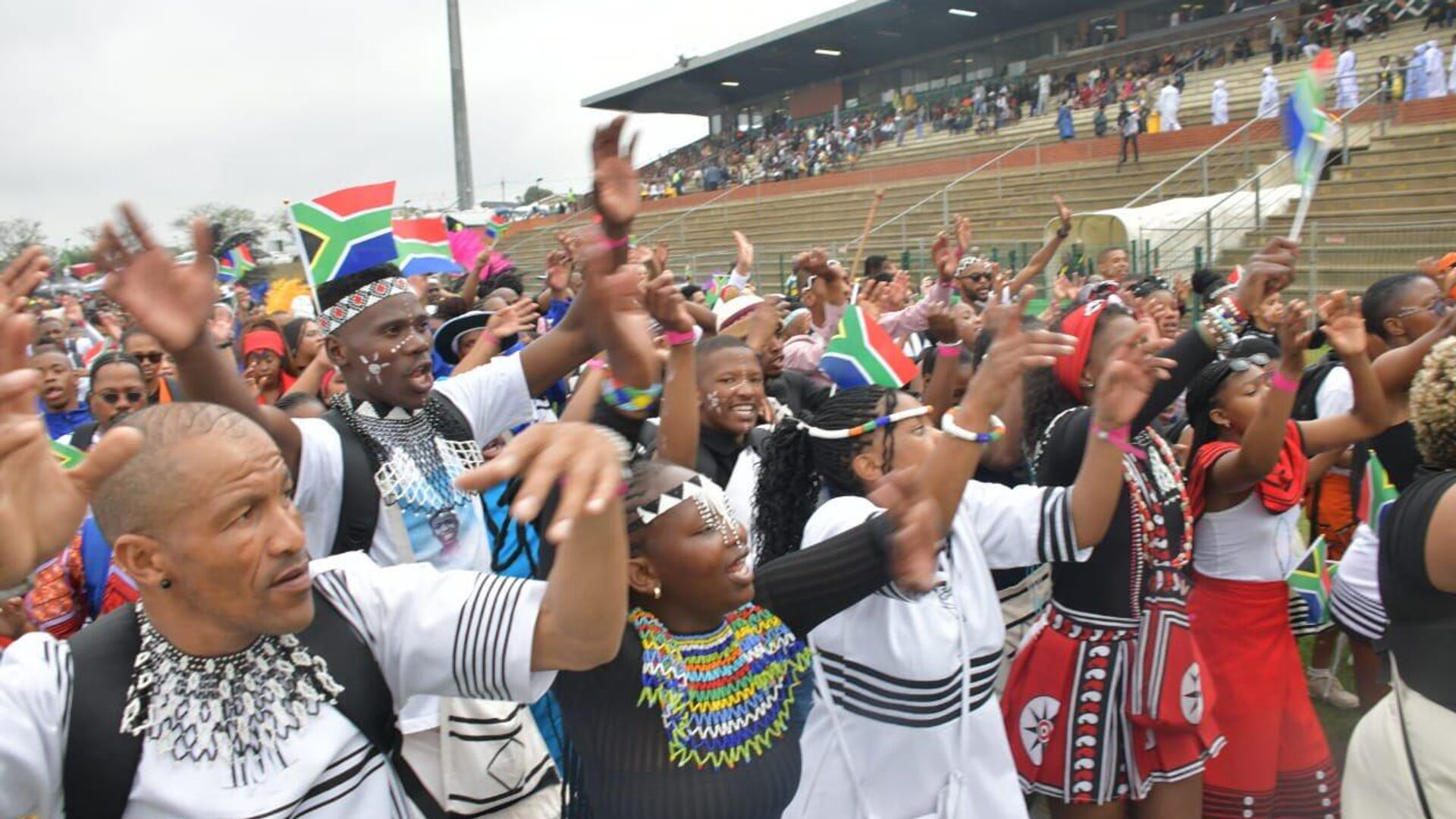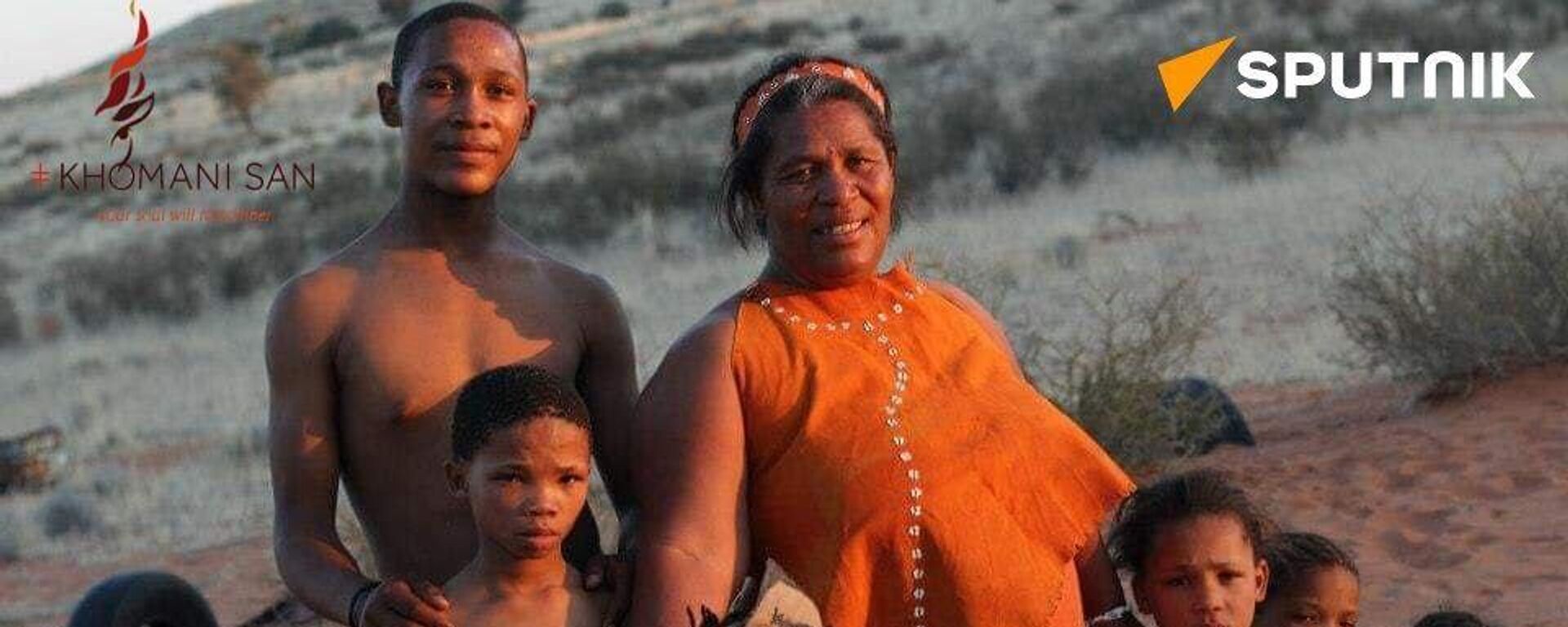https://en.sputniknews.africa/20230924/south-africas-heritage-day-celebrating-cultural-diversity-of-rainbow-nation-1062320520.html
South Africa's Heritage Day: Celebrating the 'Rainbow Nation's' Cultural Diversity
South Africa's Heritage Day: Celebrating the 'Rainbow Nation's' Cultural Diversity
Sputnik Africa
On September 24, South Africa observes Heritage Day to celebrate the country's roots and its rich, vibrant, and diverse cultures. Known as the "Rainbow... 24.09.2023, Sputnik Africa
2023-09-24T15:41+0200
2023-09-24T15:41+0200
2024-04-25T10:22+0200
features
southern africa
south africa
heritage
holidays
culture
zulu people
history
https://cdn1.img.sputniknews.africa/img/07e7/09/18/1062321646_0:66:1281:786_1920x0_80_0_0_5946f9f2748284ffe79540d3b0d17a95.jpg
Every September 24 since 1996 is a public holiday in South Africa to honor the heritage of the many cultures with different beliefs and traditions that make up the nation. On this day, South Africans are encouraged to recognize and celebrate the cultural wealth and importance of the country's heritage.Background of the HolidayThe significance of September 24 as a day of celebration dates back more than a century to the Zulu King Shaka, who died in 1828. The king was known for uniting the Zulu clans together and forming the Zulu nation. The date is believed to be King Shaka's birthday and has been celebrated as "Shaka Day" for many years. Every year, South Africans gathered at his grave to pay tribute to him and his deeds.In 1995, a request for the day to be confirmed as an official holiday was rejected. The Public Holidays Bill presented to the post-apartheid parliament in 1996 did not include the day in the list of proposed holidays. Against this backdrop, the Inkatha Freedom Party (IFP), a Zulu-majority South African political party, objected to the bill. As a result, parliament and the ruling African National Congress (ANC) reached a compromise and decided that the holiday would be known as Heritage Day. Observation of Heritage DayThe holiday provides an opportunity to appreciate South Africa's immense cultural richness and celebrate the contribution of all South Africans to the building of the nation.The country's living heritage encompasses a range of aspects, from cultural traditions and oral history to skills and techniques, indigenous knowledge systems, holistic approaches to nature and social relationships. All of these are celebrated and recognized on Heritage Day.The occasion is headed by the South African Department of Arts and Culture, which organizes various cultural events and meetings all over the country pinned to a central theme. The 2023 Heritage Day celebrations are held under the theme: "Celebrating Our Cultural Diversity in a Democratic South Africa."On this day, many people wear traditional attire and attend large festivities held throughout the country. Another way South Africans celebrate the day is by having a braai (an Afrikaans word derived from the Dutch word braden, meaning "to roast"), which is an informal barbecue often hosted by families.One of the major events organized this year is a carnival and a colorful parade at the Princess Mogogo Stadium in KwaZulu-Natal, which showcases the diversity and richness of South Africa's cultural heritage through traditional costumes, music and dance.According to the South African government, Heritage Day plays an important role in fostering social cohesion and uniting the nation through celebration, with commemorative events taking place across the country.
https://en.sputniknews.africa/20230505/african-heritage-day-khomani-san-people---unique-culture-that-has-stood-test-of-time-1059056163.html
southern africa
south africa
Sputnik Africa
feedback@sputniknews.com
+74956456601
MIA „Rossiya Segodnya“
2023
News
en_EN
Sputnik Africa
feedback@sputniknews.com
+74956456601
MIA „Rossiya Segodnya“
Sputnik Africa
feedback@sputniknews.com
+74956456601
MIA „Rossiya Segodnya“
southern africa, south africa, heritage, holidays, culture, zulu people, history
southern africa, south africa, heritage, holidays, culture, zulu people, history
South Africa's Heritage Day: Celebrating the 'Rainbow Nation's' Cultural Diversity
15:41 24.09.2023 (Updated: 10:22 25.04.2024) On September 24, South Africa observes Heritage Day to celebrate the country's roots and its rich, vibrant, and diverse cultures. Known as the "Rainbow Nation", South Africa is renowned for its rich multicultural diversity, uniting a wide range of ethnic groups and communities.
Every September 24 since 1996 is a public holiday in South Africa to honor the heritage of the many
cultures with different beliefs and traditions that make up the nation. On this day, South Africans are encouraged to recognize and celebrate the cultural wealth and importance of the country's heritage.
Background of the Holiday
The significance of September 24 as a day of celebration dates back more than a century to the
Zulu King Shaka, who died in 1828. The king was known for uniting the Zulu clans together and forming the Zulu nation. The date is believed to be King Shaka's birthday and has been celebrated as "Shaka Day" for many years. Every year, South Africans gathered at his grave to pay tribute to him and his deeds.
In 1995, a request for the day to be confirmed as an official holiday was rejected. The Public Holidays Bill presented to the post-apartheid parliament in 1996 did not include the day in the list of proposed holidays. Against this backdrop, the Inkatha Freedom Party (IFP), a Zulu-majority South African political party, objected to the bill.
As a result, parliament and the ruling African National Congress (ANC) reached a compromise and decided that the holiday would be known as Heritage Day.
Observation of Heritage Day
The holiday provides an opportunity to appreciate South Africa's immense cultural richness and celebrate the contribution of all South Africans to the building of the nation.
The country's living
heritage encompasses a range of aspects, from cultural traditions and oral history to skills and techniques, indigenous knowledge systems, holistic approaches to nature and social relationships. All of these are celebrated and recognized on Heritage Day.
The occasion is headed by the South African Department of Arts and Culture, which organizes various
cultural events and meetings all over the country pinned to a central theme. The 2023 Heritage Day celebrations are held under the theme: "Celebrating Our Cultural Diversity in a Democratic South Africa."
On this day, many people wear traditional attire and attend large festivities held throughout the country. Another way South Africans celebrate the day is by having a braai (an Afrikaans word derived from the Dutch word braden, meaning "to roast"), which is an informal barbecue often hosted by families.
One of the major events organized this year is a
carnival and a colorful parade at the Princess Mogogo Stadium in KwaZulu-Natal, which showcases the diversity and richness of South Africa's cultural heritage through traditional costumes, music and dance.
"Today is a significant day as we celebrate South Africa's rich heritage and cultural diversity. Through our culture, we express ourselves and showcase our uniqueness to the world. Happy Heritage Day, Mzansi!" said Zizi Kodwa, minister of sport, arts and culture, adding: "Let us go further together and build national unity by celebrating and embracing this diversity and our heritage."
According to the South African government, Heritage Day plays an important role in fostering social cohesion and uniting the nation through celebration, with commemorative events taking place across the country.


